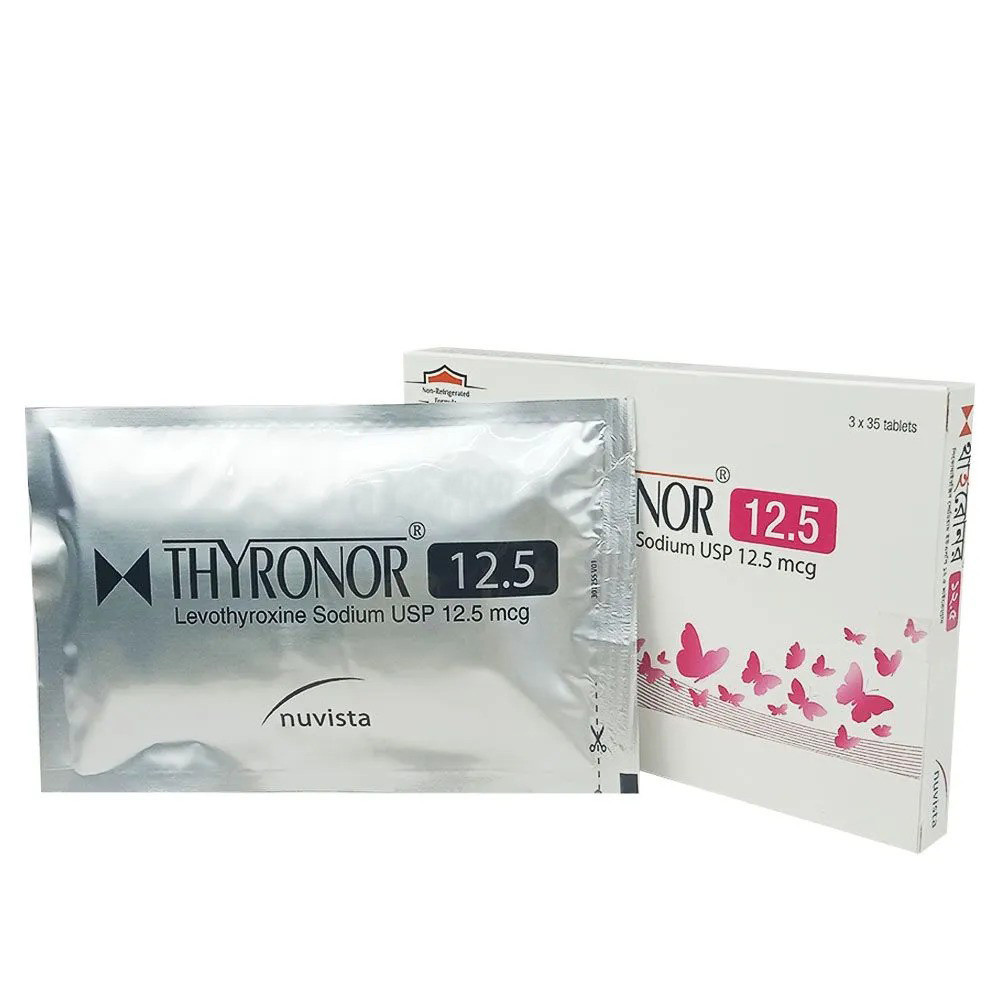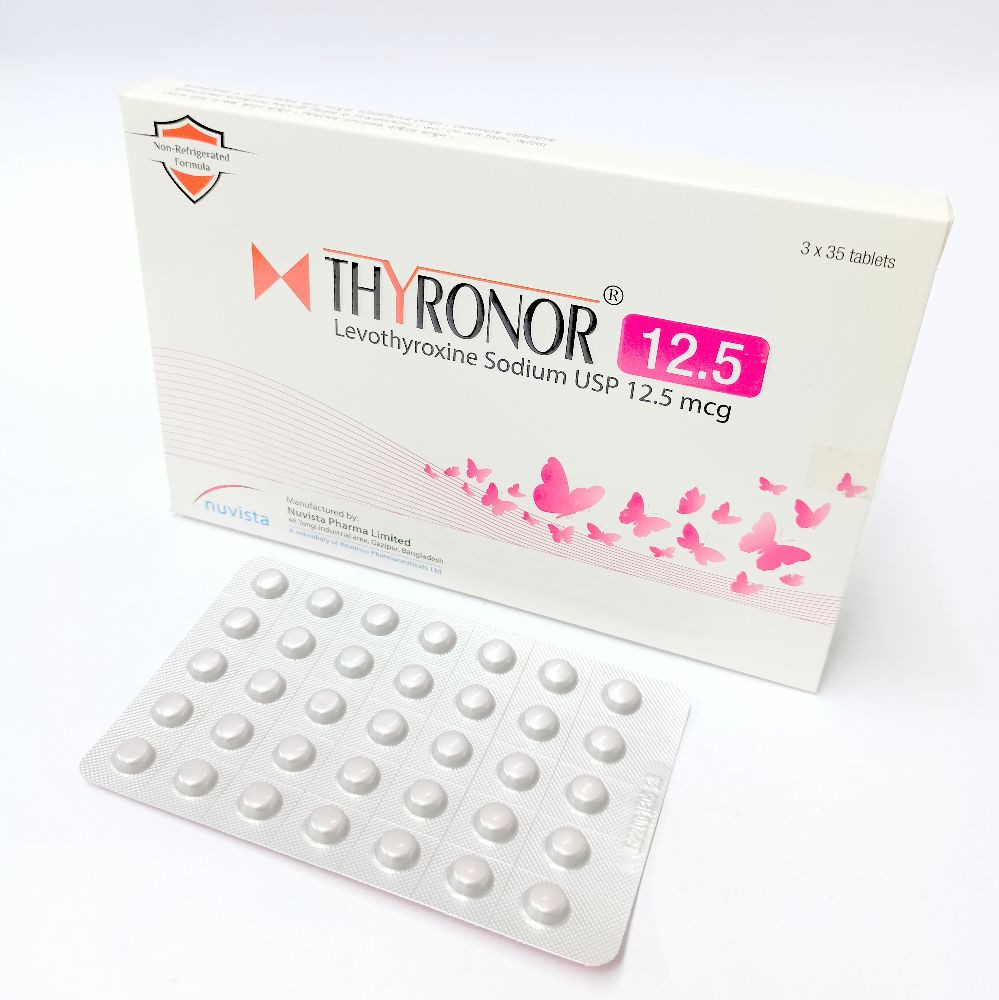Unit Price:
৳ 0.70
(3 x 35: ৳ 73.50)
Strip Price:
৳ 24.50
Also available as:
Indications
- As replacement therapy in hypothyroidism of any aetiology. Replacement therapy should not be instituted in transient hypothyroidism during the recovery phase of subacute Thyroiditis.
- For the suppression of Thyroid Stimulating Hormone (TSH) levels in the presence of goitres, nodules and after radiological and/or surgical treatment of Thyroid cancer.
- For the suppression of the goitrogenic effects of other drugs such as Lithium.
- As a diagnostic aid in suppression tests.
Pharmacology
This tablet contains synthetic Levothyroxine (also called Thyroxine or T4) which is identical to the natural hormone T4, produced in the Thyroid gland. About 30% of T4 is converted to the much more active Triiodothyronine (T3) in peripheral tissues. TBG (Thyroxine Binding Globulin) is the major carrier of T4. This binding protects T4 from metabolism and excretion resulting in its long half-life in the circulation. Only about 0.03% of total T4 in plasma is unbound. The half-life of elimination of T4 is 6 to 7 days. In hyperthyroidism, the half-life is shortened to 3 or 4 days, whereas in hypothyroidism it may be 9 to 10 days. In conditions associated with reduced protein in plasma as in nephrosis or hepatic cirrhosis or when binding to protein is inhibited by certain drugs the half-life of T4 may be shortened. The liver is the major site of degradation of Thyroid hormones. T4 is conjugated with Glucuronic and Sulphate conjugates through the Phenolic hydroxyl group and excreted in the urine.There is an enterohepatic circulation of the Thyroid hormones, since they are liberated by hydrolysis in the intestine and reabsorbed. Because of the long half-life of T4, a steady blood level of the biologically more active T3 can be obtained from one single daily dose of Levothyroxine. Therefore, variations in the therapeutic effect are unlikely once the correct dosage has been established.
Dosage & Administration
Adult dose:
Pediatric Dosage (Infants and Children): In children with chronic or severe hypothyroidism, initial dose of 25 mcg/day with increments of 25 mcg every 2-4 weeks until the desired effect is achieved. Hyperactivity in an older child can be minimized if the starting dose is one-fourth of the recommended full replacement dose and the dose is then increased on a weekly basis by an amount equal to one-fourth the full recommended replacement dose until the full recommended replacement dose is reached.
- Initial starting dose: 25-50 mcg/day, with gradual increments in dose at 6-8 week intervals, as needed. The Levothyroxine Sodium dose is generally adjusted in 12.5-25 mcg increments until the patient with primary hypothyroidism is clinically euthyroid and the serum TSH has normalized.
- In patients with severe hypothyroidism: Initial dose is 12.5-25 mcg/day with increases of 25 mcg/day every 2-4 weeks, accompanied by clinical and laboratory assessment,until the TSH level is normalized.
- In patients with secondary (pituitary) or tertiary (hypothalamic) hypothyroidism: Levothyroxine Sodium dose should be titrated until the patient is clinically euthyroid and the serum free - T4 level is restored to the upper half of the normal range.
- For patients older than 50 years or for patients under 50 years of age with underlying cardiac disease: 1.7 mcg/kg/day.
Pediatric Dosage (Infants and Children): In children with chronic or severe hypothyroidism, initial dose of 25 mcg/day with increments of 25 mcg every 2-4 weeks until the desired effect is achieved. Hyperactivity in an older child can be minimized if the starting dose is one-fourth of the recommended full replacement dose and the dose is then increased on a weekly basis by an amount equal to one-fourth the full recommended replacement dose until the full recommended replacement dose is reached.
- 0-3 months: 10-15 mcg/kg/day
- 3-6 months: 8-10 mcg/kg/day
- 6-12 months: 6-8 mcg/kg/day
- 1-5 years: 5-6 mcg/kg/day
- 6-12 years: 4-5 mcg/kg/day
- >12 years but growth and puberty incomplete: 2-3 mcg/kg/day
- Growth and puberty complete: 1.7 mcg/kg/day.
Interaction
Concurrent use of tri/tetracyclic antidepressants and Thyronor may increase the therapeutic and toxic effects of both drugs, possibly due to increased receptor sensitivity to catecholamines.Toxic effects may include increased risk of cardiac arrhythmias and CNS stimulation; onset of action of tricyclics may be accelerated. Administration of sertraline in patients stabilized on Thyronor may result in increased Thyronor requirements. Addition of Thyronor to antidiabetic or insulin therapy may result in increased antidiabetic agent or insulin requirements. Careful monitoring of diabetic control is recommended, especially when thyroid therapy is started, changed, or discontinued. Serum digitalis glycoside levels may be reduced in hyperthyroidism or when the hypothyroid patient is converted to the euthyroid state. Therapeutic effect of digitalis glycosides may be reduced.
Contraindications
- Untreated subclinical or overt Thyrotoxicosis of any etiology
- Acute Myocardial Infarction
- Uncorrected Adrenal failure.
Side Effects
Adverse reactions associated with Thyronor therapy are primarily those of hyperthyroidism due to therapeutic overdose. They include the following:
- General: Fatigue, increased appetite, weight loss, heat intolerance, fever, excessive sweating;
- Central nervous system: Headache, hyperactivity, nervousness, anxiety, irritability, emotional lability, insomnia.
- Musculoskeletal: Tremors, muscle weakness.
- Cardiovascular: Palpitations, tachycardia, arrhythmias, increased pulse and blood pressure
- Respiratory: Dyspnea.
- Gastrointestinal: Diarrhea, vomiting, abdominal cramps.
- Dermatologic: Hair loss, flushing.
Pregnancy & Lactation
Pregnancy Category A. Pregnancy may increase Levothyroxine requirements. Although Thyroid hormones are excreted only minimally in human milk,caution should be exercised when it is administered to a nursing woman.However, adequate replacement doses of Levothyroxine are generally needed to maintain normal lactation.
Precautions & Warnings
- In patients whose hypothyroidism is due to a decrease in pituitary gland function, there may also be adrenocortical insufficiency;before starting Thyronor therapy, this should be treated by adequate replacement with Corticosteroids to prevent acute adrenal insufficiency.
- The choice of the starting dose and of any increases in dosing should be made with great care in patients with cardiovascular disease and/or severe and long-existing hypothyroidism.Too high an initial dose or too rapid an increase in dosing may lead to development or worsening of angina complaints, arrhythmias, myocardial infarction, cardiac failure or to sudden increase in blood pressure, especially in older patients.
- Any marked change of body weight during treatment with T4 requires adjustment of the dosage.
- When monitoring blood levels of T3 and T4, it should be borne in mind that a "high" normal to slightly increased T4 level will be necessary in order to obtain a normal level of T3. The correct dosage of Thyronor in primary hypothyroidism should generally be established by monitoring the serum level of TSH to see whether it has normalized. Because intoxication with Thyroid preparations may have serious consequences.
Overdose Effects
The signs and symptoms of overdose are those of hyperthyroidism - agitation, confusion, irritability, hyperactivity, headache, sweating, mydriasis, tachycardia, arrhythmias, tachypnoea, pyrexia, increased bowel movements and convulsions. Cerebral embolism, shock, coma, and death have been reported. Symptoms may not necessarily be evident or may not appear until several days after ingestion of Thyronor. Dose of Thyronor should be reduced or temporarily discontinued if signs or symptoms of overdosage occur. Treatment is symptomatic.
Therapeutic Class
Thyroid drugs & hormone
Storage Conditions
Store below 30°C and dry place, protect from light. Keep out of the reach of children.
Pack Images: Thyronor 12.5 mcg Tablet



